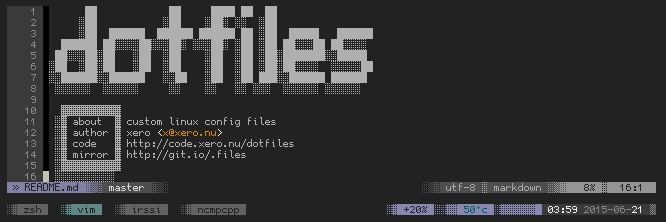neovim/.config/nvim/lua/plugins/lsp/init.lua
return {
"neovim/nvim-lspconfig",
dependencies = {
"folke/neodev.nvim",
"b0o/schemastore.nvim",
"williamboman/mason-lspconfig.nvim",
"https://git.sr.ht/~whynothugo/lsp_lines.nvim",
},
event = { "BufReadPre", "BufNewFile" },
config = function()
require("neodev").setup({})
require("lsp_lines").setup()
local lspconfig = require("lspconfig")
local remaps = require("plugins.lsp.remaps")
local icons = require("utils.icons")
local presentCmpNvimLsp, cmp_lsp = pcall(require, "cmp_nvim_lsp")
local presentLspSignature, lsp_signature = pcall(require, "lsp_signature")
vim.lsp.set_log_level("error") -- 'trace', 'debug', 'info', 'warn', 'error'
local function on_attach(client, bufnr)
remaps.set_default_on_buffer(client, bufnr)
if presentLspSignature then
lsp_signature.on_attach({ floating_window = false, timer_interval = 500 })
end
end
local signs = {
{ name = "DiagnosticSignError", text = icons.diagnostics.error },
{ name = "DiagnosticSignWarn", text = icons.diagnostics.warning },
{ name = "DiagnosticSignHint", text = icons.diagnostics.hint },
{ name = "DiagnosticSignInfo", text = icons.diagnostics.information },
}
for _, sign in ipairs(signs) do
vim.fn.sign_define(sign.name, { texthl = sign.name, text = sign.text, numhl = "" })
end
local config = {
virtual_text = false, -- appears after the line
virtual_lines = false, -- appears under the line
signs = {
active = signs,
},
flags = {
debounce_text_changes = 200,
},
update_in_insert = true,
underline = true,
severity_sort = true,
float = {
focus = false,
focusable = false,
style = "minimal",
border = "shadow",
source = "always",
header = "",
prefix = "",
},
}
lspconfig.util.default_config = vim.tbl_deep_extend('force', lspconfig.util.default_config, config)
vim.diagnostic.config(config)
local border = {
border = "shadow",
}
vim.lsp.handlers["textDocument/signatureHelp"] = vim.lsp.with(vim.lsp.handlers.hover, border)
vim.lsp.handlers["textDocument/hover"] = vim.lsp.with(vim.lsp.handlers.hover, border)
local capabilities
if presentCmpNvimLsp then
capabilities = cmp_lsp.default_capabilities(vim.lsp.protocol.make_client_capabilities())
else
capabilities = vim.lsp.protocol.make_client_capabilities()
end
local servers = {
bashls = require("plugins.lsp.servers.bashls")(on_attach),
cssls = {},
dockerls = {},
-- eslint = require("plugins.lsp.servers.eslint")(on_attach),
html = {},
jsonls = {},
lua_ls = require("plugins.lsp.servers.luals")(on_attach),
pylsp = {},
rust_analyzer = {},
terraformls = {},
tflint = {},
tsserver = require("plugins.lsp.servers.tsserver")(on_attach),
yamlls = {},
}
local default_lsp_config = {
on_attach = on_attach,
capabilities = capabilities,
flags = {
debounce_text_changes = 200,
allow_incremental_sync = true,
},
}
local server_names = {}
for server_name, _ in pairs(servers) do
table.insert(server_names, server_name)
end
local present_mason, mason = pcall(require, "mason-lspconfig")
if present_mason then
mason.setup({ ensure_installed = server_names })
end
for server_name, server_config in pairs(servers) do
local merged_config = vim.tbl_deep_extend("force", default_lsp_config, server_config)
lspconfig[server_name].setup(merged_config)
if server_name == "rust_analyzer" then
local present_rust_tools, rust_tools = pcall(require, "rust-tools")
if present_rust_tools then
rust_tools.setup({ server = merged_config })
end
end
end
end
}

